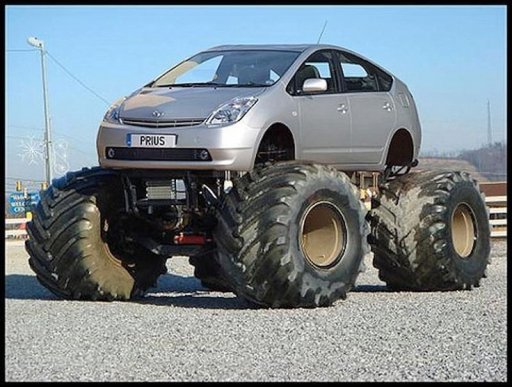I'm going to agree yet disagree.
For someone like me, a "PROPER" used vehicle is best. Yet, I find myself edging toward my new Tacoma and considering selling my Cruiser. This is because I'm getting burned out on its build and maintenance. Then again, there is no way I will be able to repair the Tacoma 20 years from now.
Moak. How the new rig coming along?
Like
@MOAK, my current vehicle is a 96, 80 series. Where we differ is mine has a rebuilt engine, trans and transfer case as well as a few mods to strengthen. I'm about 30k and still need paint and carpet. My vehicle new sold for 45k. To make my vehicle compatible with one new, I'm about 5k-7k away and will still have 25 year old wiring, window regulators and various small things like that. I do have all new rubber seals and managed to get the important ones before they were discontinued. With a few exceptions, the vehicle is almost completely new or rebuilt, mostly with Toyota parts and stronger upgrade. When its completed, I will be close to what the vehicle cost new, 25 years ago.
In my history, I built well over a dozen off road rigs with three of them being built as proper overland vehicles, all used. In my opinion, the biggest obstacle to owning a used vehicle is not having proper mechanical knowledge. Those people should buy a new vehicle and have simple mods done.
My opinion is not so much based on my offroad vehicles but a life time as a tech and avid off roader. For 30 years, I helped out with big off road events. At each event, I saw hundreds of proper and improperly built vehicles. During that time I was also in a large off road club.
What I saw was vehicles failing due to improperly installed mods, wrong mods, incorrect maintenance and vehicles built for a purpose not what it was being used for. I also saw that quite often in this forum. It gets down to a whole lot of "its good enough". Well as someone who has rescued many a broken vehicle, I say it is not.
What it gets down to is knowledge and luck. Knowledge to be able to "PROPERLY" build and maintain a vehicle or have the money to have it properly built and maintained. Luck is for the improperly built and finding someone who can properly build and help you maintain it.
In this forum alone I have communicated and known people who went down the used overland rabbit hole just to end up with a pile of crap because they bought something they didn't understand and didn't have the knowledge to make reliable. What's worse is those who trusted their "mechanic" to have knowledge about custom off road vehicles. Lets not get me started on the whole "Overland Trailer" rant.
Those people are not vocal. Those people wasted a bunch of money, built something unreliable then when it turned into a money pit, sold it and will never own an off road vehicle again. They disappeared and never understood what went wrong. This is why this forum isn't full of those type of posts.
Sorry but, the people who advocate building a used off road vehicle have the knowledge to do so, or are lucky enough to not have major issues while their out in the boonies. Not everyone can properly maintain a used off road vehicle. Once you start driving in dirt, the life span of the parts drops considerably. It also doesn't help that most of the aftermarket parts cant hold up to off road driving and require a diffrent maintenance schedule. The cheaper end of off road parts are designed to give you that "Off Road Look" not hold up to the realities of even dirt road driving. Try to find a mechanic who understands this.
Building a reliable off road vehicle is expensive. I'm a firm believer in buy once cry once. I hate doing the same repair over and over.
Here is where I agree with
@reaver. The new vehicles are expensive and overly complicated. Toyota has always been on the top of the food chain when it comes to reliability. That was true until Mr. Toyoda died and JR took over. In their public board meetings, JR would was all about profit and dad was about reliability. JR would use ford, GM and Jeep as examples of how they can build small turbo motors because that's what the public wants. Dad said, look at the reliability with those and no, you will not do that as long as I'm alive. Well, now JR is in charge and the failure rate on trucks with under 5k is through the roof. I know this because I'm a trainer for Toyota. I have students in all of the local dealers. I have also trained instructors who train for Volvo, Mercedes, Ford, GM and Tesla to name a few. I keep in touch with them still. That means I'm on top of most manufactures lack of reliability as well.
When it comes to new vehicles, most manufactures build the vehicle with a projected five year life span. Toyota was one of the only who didn't follow that mind set. You cant build vehicles that last. If you did, how would you sell the cars you have pouring out of the factories every day.
When it comes to used vehicles, the manufacture must build parts for ten years. What people don't know about is the grey area. The law states ten years, it doesn't state "same color". Exact part will only be as long as that body design (4 years), after that it just has to fit, work properly and be safe. The only reason you can get a part after ten years is because they screwed up on their prediction and they have a bunch left over. But hey, its just an off road vehicle, having one red seat belt in a tan interior is ok. You can always go to the junk yard and get another 15 year old worn out part and hope it goes a few years before you have to get another worn part that's now twenty years old. The only reason I have been able to get new parts for my 25 year old vehicles is they made a ton of them outside this country into the early 2000's. Even then, parts are getting scarce.
Classic vehicles have a whole cult around remaking parts. Old Jeeps, Mustangs and Camaro's don't count here.
I must add this. Some manufactures have rewritten their repair manuals with mis-conceptions, half truth's and the trainers are forced to repeat these. An example is Brake fluid. The life span of DOT 3 is actually 3-4 years. It needs to be replaced every brake job which averages every 5 years. Five years was written in every manual and the fluid manufacture says less because the car manufacture allows a percentage of acid in the fluid. This lessens the life of the rubber. Brake fluid manufactures want you to replace it before the acid forms, thus the 3-4 years (Dot 4 is half that).
Today, some of the manufacture don't want their tech's replacing brake fluid because its "Lifetime". What you don't know is the "Lifetime" of the vehicle is considered 4-5 years. So...technically their not lying. This holds true for most vehicle fluids. What I run into now, is the counter argument to that with the guy holding up a shop manual showing me where I'm wrong. My only rebuttal is, do the research and learn how it all really works. Brake fluid hasn't evolved into something magical. The sad part is, no one wants to do the research. They want someone to tell them, they don't actually want to learn it. I hate arguing with the technicians I'm trying to properly train.
I'm also not going to rant about the crap aftermarket part world and the over lack of "Properly Trained" random mechanics. I see that issue daily.
Summarizing all that.
1. If you have no knowledge, buy new, but understand the complexity and the reliability is not the same as "some" used.
2. Be very careful buying a used built vehicle. You are probably buying someone's improperly built headache.
3. Most manufactures build the vehicles to last 4-5 years. The public has been programed around this. Why do you think they introduced lease programs, years ago.
4. Most people who get into this don't understand what it actually takes to maintain an off road rig. All you need to do is have followed this forum for several years. The successful people are mostly still around. That's because they understand this and are willing to do what it takes.
5. Most mechanics don't understand what it takes to properly maintain these.
6. Most mechanics don't understand what it takes to build these.
7. the vehicle manufactures will tell you partial truths.
Lastly.
Your vehicle was never really designed to go off road. factory off road vehicles are built for comfort first, off road second. Once you start modding a vehicle, you now own a Frankenstein. "You" need to be the expert here. Don't expect a mechanic to understand the difference between tie rod ends, ball joints, heims and uni ball. Most mechanics don't actually understand the factory parts let alone have any actual formal training.
People can argue these points all they want. I stand firm with what I say because I not only have been there but still am. Believe me when I say, I only touched the tip of the iceberg when it comes to aftermarket parts, vehicle reliability and mechanic knowledge.







